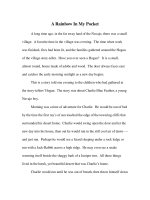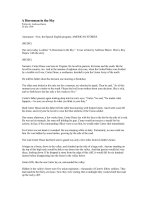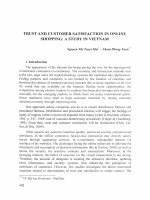A Prisoner in Fairyland
Bạn đang xem bản rút gọn của tài liệu. Xem và tải ngay bản đầy đủ của tài liệu tại đây (93.27 KB, 11 trang )
A Prisoner in Fairyland
By
Algernon Blackwood
Web-Books.Com
A Prisoner in Fairyland
Chapter 1....................................................................................................... 4
Chapter 2....................................................................................................... 9
Chapter 3..................................................................................................... 18
Chapter 4..................................................................................................... 23
Chapter 5..................................................................................................... 29
Chapter 6..................................................................................................... 39
Chapter 7..................................................................................................... 43
Chapter 8..................................................................................................... 51
Chapter 9..................................................................................................... 57
Chapter 10................................................................................................... 68
Chapter 11................................................................................................... 74
Chapter 12................................................................................................... 80
Chapter 13................................................................................................... 84
Chapter 14................................................................................................... 97
Chapter 15................................................................................................. 102
Chapter 16................................................................................................. 112
Chapter 17................................................................................................. 120
Chapter 18................................................................................................. 128
Chapter 19................................................................................................. 137
Chapter 20................................................................................................. 144
Chapter 21................................................................................................. 152
Chapter 22................................................................................................. 155
Chapter 23................................................................................................. 165
Chapter 24................................................................................................. 178
Chapter 25................................................................................................. 188
Chapter 26................................................................................................. 197
Chapter 27................................................................................................. 208
Chapter 28................................................................................................. 215
Chapter 29................................................................................................. 224
Chapter 30................................................................................................. 233
Chapter 31................................................................................................. 239
Chapter 32................................................................................................. 247
Chapter 33................................................................................................. 254
Chapter 34................................................................................................. 263
Chapter 1
Man is his own star; and the soul that can
Render an honest and a perfect man
Commands all light, all influence, all fate,
Nothing to him falls early, or too late.
Our acts our angels are, or good or ill,
Our fatal shadows that walk by us still.
BEAUMONT AND FLETCHER.
Minks--Herbert Montmorency--was now something more than secretary, even
than private secretary: he was confidential-private-secretary, adviser, friend; and
this, more because he was a safe receptacle for his employer's enthusiasms than
because his advice or judgment had any exceptional value. So many men need
an audience. Herbert Minks was a fine audience, attentive, delicately responsive,
sympathetic, understanding, and above all--silent. He did not leak. Also, his
applause was wise without being noisy. Another rare quality he possessed was
that he was honest as the sun. To prevaricate, even by gesture, or by saying
nothing, which is the commonest form of untruth, was impossible to his
transparent nature. He might hedge, but he could never lie. And he was 'friend,'
so far as this was possible between employer and employed, because a pleasant
relationship of years' standing had established a bond of mutual respect under
conditions of business intimacy which often tend to destroy it.
Just now he was very important into the bargain, for he had a secret from his wife
that he meant to divulge only at the proper moment. He had known it himself but
a few hours. The leap from being secretary in one of Henry Rogers's companies
to being that prominent gentleman's confidential private secretary was, of course,
a very big one. He hugged it secretly at first alone. On the journey back from the
City to the suburb where he lived, Minks made a sonnet on it. For his emotions
invariably sought the safety valve of verse. It was a wiser safety valve for high
spirits than horse-racing or betting on the football results, because he always
stood to win, and never to lose. Occasionally he sold these bits of joy for half a
guinea, his wife pasting the results neatly in a big press album from which he
often read aloud on Sunday nights when the children were in bed. They were
signed 'Montmorency Minks'; and bore evidence of occasional pencil corrections
on the margin with a view to publication later in a volume. And sometimes there
were little lyrical fragments too, in a wild, original metre, influenced by Shelley
and yet entirely his own. These had special pages to themselves at the end of
the big book. But usually he preferred the sonnet form; it was more sober, more
dignified. And just now the bumping of the Tube train shaped his emotion into
something that began with
Success that poisons many a baser mind
With thoughts of self, may lift--
but stopped there because, when he changed into another train, the jerkier
movement altered the rhythm into something more lyrical, and he got somewhat
confused between the two and ended by losing both.
He walked up the hill towards his tiny villa, hugging his secret and anticipating
with endless detail how he would break it to his wife. He felt very proud and very
happy. The half-mile trudge seemed like a few yards.
He was a slim, rather insignificant figure of a man, neatly dressed, the City clerk
stamped plainly over all his person. He envied his employer's burly six-foot
stature, but comforted himself always with the thought that he possessed in its
place a certain delicacy that was more becoming to a man of letters whom an
adverse fate prevented from being a regular minor poet. There was that touch of
melancholy in his fastidious appearance that suggested the atmosphere of
frustrated dreams. Only the firmness of his character and judgment decreed
against the luxury of longish hair; and he prided himself upon remembering that
although a poet at heart, he was outwardly a City clerk and, as a strong man,
must permit no foolish compromise.
His face on the whole was pleasing, and rather soft, yet, owing to this warring of
opposing inner forces, it was at the same time curiously deceptive. Out of that
dreamy, vague expression shot, when least expected, the hard and practical
judgment of the City--or vice versa. But the whole was gentle--admirable quality
for an audience, since it invited confession and assured a gentle hearing. No
harshness lay there. Herbert Minks might have been a fine, successful mother
perhaps. The one drawback to the physiognomy was that the mild blue eyes
were never quite united in their frank gaze. He squinted pleasantly, though his
wife told him it was a fascinating cast rather than an actual squint. The chin, too,
ran away a little from the mouth, and the lips were usually parted. There was, at
any rate, this air of incompatibility of temperament between the features which,
made all claim to good looks out of the question.
That runaway chin, however, was again deceptive. It did, indeed run off, but the
want of decision it gave to the countenance seemed contradicted by the
prominent forehead and straight eyebrows, heavily marked. Minks knew his
mind. If sometimes evasive rather than outspoken, he could on occasion be
surprisingly firm. He saw life very clearly. He could certainly claim the good
judgment stupid people sometimes have, due perhaps to their inability to see
alternatives-- just as some men's claim to greatness is born of an audacity due to
their total lack of humour.
Minks was one of those rare beings who may be counted on--a quality better
than mere brains, being of the heart. And Henry Rogers understood him and
read him like an open book. Preferring the steady devotion to the brilliance a high
salary may buy, he had watched him for many years in every sort of
circumstance. He had, by degrees, here and there, shown an interest in his life.
He had chosen his private secretary well. With Herbert Minks at his side he might
accomplish many things his heart was set upon. And while Minks bumped down
in his third-class crowded carriage to Sydenham, hunting his evasive sonnet,
Henry Rogers glided swiftly in a taxi-cab to his rooms in St. James's Street, hard
on the trail of another dream that seemed, equally, to keep just beyond his actual
reach.
It would certainly seem that thought can travel across space between minds
sympathetically in tune, for just as the secretary put his latch-key into his shiny









